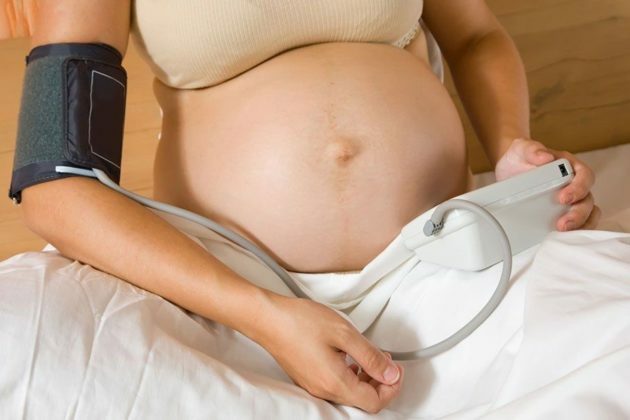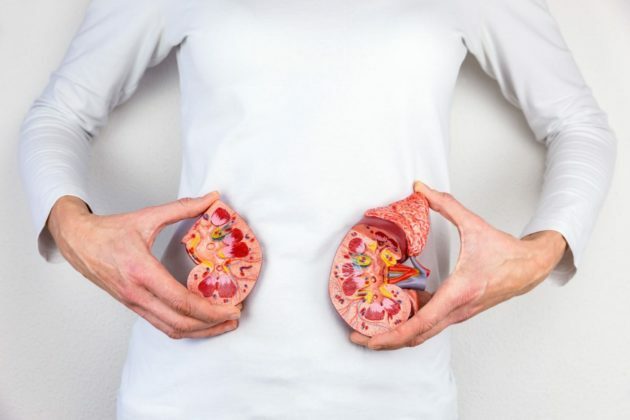Content
- 1 What is and stages of nephropathy in pregnant women
- 2 Causes of nephropathy in pregnancy
- 3 Symptoms of nephropathy in pregnancy
- 4 Diagnosis of nephropathy in pregnant women
-
5 Principles of treatment of nephropathy in pregnancy
- 5.1 Nutrition program for a pregnant woman with nephropathy
- 6 Preventive measures and forecasts
- 7 Conclusion
Toxicosis, characteristic of pregnant women, often manifests itself in the early stages of gestation. However, in gynecological practice, it often occurs in the last months. In this case, it is customary to talk about such a disease as nephropathy of pregnant women. This special condition occurs, as a rule, during a complicated period of gestation and is considered dangerous for both the expectant mother and the child. Nephropathy of pregnancy is known under the code O14.9 according to ICD 10.
What is and stages of nephropathy in pregnant women
Nephropathy of pregnant women is diagnosed at late gestation, due to the rapid increase in serum creatinine. Against this background, blood pressure rises and the normal functioning of the kidneys decreases.
The disease can be primary or secondary. In the first case, it occurs spontaneously, in the second it is a consequence of other diagnoses of a pregnant woman.
Stages of nephropathy during pregnancy:
- Nephropathy of the 1st degree of pregnant women. It is characteristic if the pressure of the future woman in labor does not rise above 140/80 mm Hg. Art. The level of proteinuria reaches at the same time 1 g/l.
- Nephropathy of the 2nd degree of pregnant women. Blood pressure indicators are very high, can reach 170/110 mm Hg. Art. The level of proteinuria is 3-4 g/l, diuresis is 40 ml per hour.
- Nephropathy of the 3rd degree of pregnant women. The most dangerous variant of the diagnosis, in which pressure indicators can reach 170/120 mm Hg. Art. Urine output is less than 40 ml per hour, and granular cylindrical bodies appear in the urine.

A neglected state of nephropathy can lead to the development of a more dangerous diagnosis - preeclampsia.
The last stage of nephropathy is often characterized by a fainting condition of a pregnant woman, which may be accompanied by flatulence, increased thirst, drowsiness and dyspeptic disorders.
Causes of nephropathy in pregnancy
As a rule, the development of the disease is due to a strong spasm of the vascular system. It, in turn, is associated with an active increase in the concentration of vasoactive substances in the body. Against the background of such a spasm, there is a sharp decrease in:
- renal function;
- glomerular filtration rate.
These two phenomena, in turn, lead to the development of renal failure. Since the excretory system does not cope with its task due to sodium retention, swelling of the internal organs occurs. The kidney tissues are in an ischemic state, which further increases the spasm.
The triggers for nephropathy are:
- multiple pregnancy;
- severe toxicosis in the first trimester (especially if this is the first experience of future motherhood);
- pathology of the kidneys of the expectant mother;
- gestation over the age of 35;
- a history of arterial hypertension;
- the presence of bad habits;
- excessive weight gain, obesity of the expectant mother;
- hereditary diseases.
Important! Additional causes of nephropathy are hormonal failure and impaired placental and uterine blood supply.
Symptoms of nephropathy in pregnancy
Modern gynecology highlights the following signs of nephropathy in pregnant women:
- Symptoms of arterial hypertension - high blood pressure, its jumps.
- Puffiness.
- The presence of protein in the urine, and the severity of proteinuria depends on the severity of preeclampsia and the level of kidney damage.
- Decreased urine output is called oliguria.
The simultaneous development of all the symptoms of the disease at once is typical for only half of the women in labor.
On the part of a patient with nephropathy, the following complaints are often received:
- headache;
- shortness of breath;
- dizziness;
- frequent urination;
- weakness;
- visual impairment;
- pain in the lumbar region.
Attention! According to statistics, the distribution of the diagnosis is very extensive, since it often occurs in the last stages of gestation, even in those women whose kidneys were previously healthy.

The appearance of the disease is more likely in those women who have already encountered it in a previous pregnancy.
Diagnosis of nephropathy in pregnant women
Diagnosis of the disease occurs taking into account the following points:
- patient complaints;
- clinical examination;
- history data;
- the use of instrumental and laboratory methods of examination.
If a woman's kidneys were considered healthy before pregnancy, the diagnosis of nephropathy is made if there are at least three symptoms - swelling, protein in the urine, and high blood pressure. Similar signs appear in the presence of chronic kidney disease before gestation, however, in this case, they begin to manifest themselves from the very beginning.
An important point is the study of the patient's history, this will allow us to understand the causes of the development of nephropathy. In this capacity, heart disease, chronic diseases of the urinary system (including past ones), diabetes mellitus, CNS damage, overweight, hereditary factors, etc. can act.
Among laboratory and instrumental methods, the following are used:
- blood chemistry;
- clinical blood test;
- general urine analysis;
- quantitative determination of protein in urine;
- ECG;
- Ultrasound of the heart;
- Ultrasound of the kidneys and fetus;
- doppler of umbilical arteries;
- fetal CTG;
- daily blood pressure monitoring.
Additionally, ophthalmoscopy is prescribed to assess the fundus.
Principles of treatment of nephropathy in pregnancy
Therapy of nephropathy in pregnant women is carried out by a nephrologist (urologist) together with a gynecologist, the clinical recommendations are as follows:
- bed rest;
- dieting;
- drug therapy.
Of the medicines, only those drugs are prescribed that will not harm the unborn baby. As a rule, these are medicines of the following groups:
- Mild sedatives that normalize the activity of the nervous system.
- Diuretic medicines to reduce swelling and remove excess fluid from the body.
- Drugs for lowering blood pressure.
- Means for relief of vascular spasm.
- Complexes of vitamins.
- Antireagents and medicines aimed at replenishing the level of protein in the body.
Warning! With an increase in the clinical picture of nephropathy and the absence of the effect of the treatment, termination of pregnancy may be required. In this case, we will talk about the need to save the life of the expectant mother.
Nutrition program for a pregnant woman with nephropathy
Women with a similar diagnosis are shown a special diet. It should include:
- restriction of salt to 3 g per day;
- fluid restriction to 700 ml per day;
- an increase in vegetables and fruits in the menu (especially those whose composition is rich in potassium).

In a complicated pregnancy, it is important to take blood and urine tests at least once a month.
Preventive measures and forecasts
The basis for the prevention of nephropathy is timely registration and regular examinations by a gynecologist, as well as control of weight, pressure and tests. Such measures will allow to identify the onset of the disease and promptly begin adequate therapy.
Important! A pregnant woman must necessarily report the presence of toxicosis to the attending physician. Often this is the first symptom indicating the onset of the development of nephropathy.
Ignoring these rules can lead to the following complications:
- detachment of the placenta;
- uterine bleeding, leading to the expulsion of the fetus from the womb;
- kidney failure, damage to the entire urinary system;
- miscarriage, late term - premature birth;
- preeclampsia and eclampsia are rather severe forms of preeclampsia with high blood pressure;
- fetal hypoxia.
Important! A child with nephropathy of the expectant mother does not suffer too much, but inaction increases the risk of intrauterine death. Additionally, the development of pathologies of other organs of a woman and a child is possible.
The prognosis for such a diagnosis depends not only on the severity, but also on the adequacy of the prescribed treatment.
Conclusion
Pregnancy nephropathy is a severe pathological condition that manifests itself in late gestation. It is characterized by renal insufficiency and high blood pressure, from the indicators of which it is customary to divide the diagnosis into several degrees. The disease requires mandatory treatment and constant monitoring of the patient by a gynecologist in order to assess the effectiveness of the therapy.
The information and materials on this site are provided for informational purposes only. You should not rely on the information as a substitute for actual professional medical advice, assistance or treatment.
